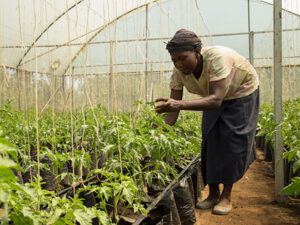The Role of Private Finance and Investment in the Promotion of Climate-Smart Technologies in Agriculture

Agriculture is one of the biggest contributors to greenhouse gas emissions, accounting for approximately a quarter of global emissions annually. The sector is also one of the most vulnerable to the impacts of climate change, particularly for smallholder farmers operating in low- and middle-income countries. Unsustainable agricultural practices have been degrading ecosystems through the overuse of chemical pesticides and fertilisers, the clearing of forests for agricultural expansion, the reduction of soil quality, the depletion of limited water resources, and the destruction of habitats for wildlife.
Technological innovations emerge as part of the solution to support the decarbonisation of the sector and enable the sector to adapt to climate change. Agricultural technologies range from ‘hard’ solutions like solar-powered irrigation systems to ‘soft’ solutions like early warning systems that enable agricultural actors to stay informed about climatic hazards. Climate-smart technology – or climate smart agriculture (CSA) – supports the sustainable management of farms in response to climate change. CSA is composed of three pillars:
- Sustainably increasing agricultural productivity and incomes
- Adapting and building resilience to climate change
- Reducing and/or removing greenhouse gases where possible
CSA technologies contribute to mitigation efforts and support adaptation while still enabling smallholder farmers, in particular, to pursue sustainable and productive livelihoods. So far, investment into CSA has remained limited, with barriers including issues of scale, affordability, and risk associated with the agriculture sector deterring investors and stifling the innovation of climate-smart technologies.
PlanAdapt has been working with CABI on a project for the FCDO’s CASA Programme to explore the role of private finance and investment in the promotion of climate-smart technologies in the agricultural sectors of Africa and Asia. The work focused on exploring the different players operating within the climate finance landscape and the range of funding mechanisms and financial instruments available for CSA technologies. PlanAdapt conducted a landscape analysis to understand the characteristics which lead to the financing of CSA technologies. The analysis exposed the main trends in CSA technology financing and reveal the barriers which inhibit the leveraging of greater volumes of private finance for CSA. This work will also highlight emerging opportunities and innovative approaches for CSA  technology financing. The study was supported by a series of key informant interviews. Alongside this, PlanAdapt undertook a more targeted enabling environment analysis to understand how the enabling environment, including policies, markets, and structures, supports or hinders the scaling up of CSA technologies through climate finance.
technology financing. The study was supported by a series of key informant interviews. Alongside this, PlanAdapt undertook a more targeted enabling environment analysis to understand how the enabling environment, including policies, markets, and structures, supports or hinders the scaling up of CSA technologies through climate finance.
When more is understood about the state of climate finance for CSA technologies, then more strategic investments into existing and emerging technologies can be made, particularly in geographical regions and parts of the innovation lifecycle where investment is lacking. Investment in CSA technologies has multiple benefits: it supports the agriculture sector to become more resilient to climatic shocks and hazards; it contributes to mitigation efforts by promoting activities and technologies that reduce greenhouse gas emissions; while also sustaining farmers’ livelihoods and improving food security.
The final report ‘Private finance investment opportunities in climate-smart agriculture technologies’ is available to download here.
